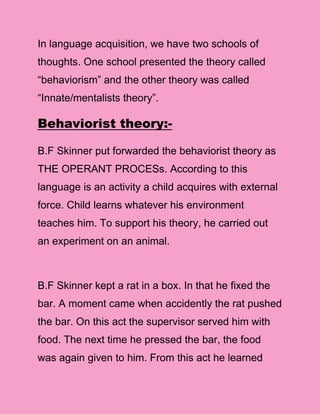
Theories of Language Acquisition: Behaviorism vs Innate Theory
- 1. In language acquisition, we have two schools of thoughts. One school presented the theory called “behaviorism” and the other theory was called “Innate/mentalists theory”. Behaviorist theory:- B.F Skinner put forwarded the behaviorist theory as THE OPERANT PROCESs. According to this language is an activity a child acquires with external force. Child learns whatever his environment teaches him. To support his theory, he carried out an experiment on an animal. B.F Skinner kept a rat in a box. In that he fixed the bar. A moment came when accidently the rat pushed the bar. On this act the supervisor served him with food. The next time he pressed the bar, the food was again given to him. From this act he learned
- 2. that whenever he wants to have food, he must press the bar. Then, the task was made difficult. Skinner fitted a flashlight in the box of rat. Then the rat learned that each time the light flashes, he get food. This experiment was made an evidence to support that in the same manner a child learns what his society wants him to learn. A child imitates no matter what he hears from his parents. So, language acquisition is an act of imitation. According to this concept, stimulus carries a response followed by reinforcement which results in repetition. For instance, a stimulus is produced when a child feels hungry or lonely. The baby cries in response. The reinforcement is when the mother comforts him. The same process which happens again is called as repetition. In this way baby learns the new behavior that every time he feels hungry, he cries.
- 3. Reinforcement is of two types: 1)POSITIVE REINFORCEMENT: Positive reinforcement results in increase of repetition process. For example, a child cries for candy, he receives the candy and learns that crying results in candy. 2)NEGATIVE REINFORCEMENT: Negative reinforcement results in reduction of repetition process. For example, a child cries for candy, but he is slapped and he learns that slap is the consequence of crying. As a result the child ceases crying for the accomplishment of his desires. THEORY INNATE/MENTALIST:- IN conflict TO BEHAVIORIST THEORY, Noam Chomsky presented “mentalists theory”.
- 4. This theory was of the view that child acquires learning with his cognitive ability whereas ecological factors are not disturbed in language learning. Man is superior to animals in all aspects of life. With the respect of language acquisition also, we can never apply the rules and principles to language learning which are derived from experiments on animals. Human beings are blessed with the power of thinking and animals are not. Man has he strong cognitive ability which stores the vocabulary in lexicon and then uses with the formulation of syntax. Child at first learns words in isolation and later on uses them in sentences without knowing their rules of grammatical structure. Here, the question arises that how a child learns to handle irregular grammatical patterns then? So, the reason is that
- 5. language is a matter of maturation rather than imitation.